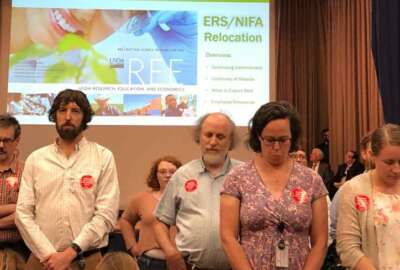USDA relocation takes another key step with lease signing for permanent office space
The Agriculture Department finalized a new lease for permanent office space in Missouri, which will house employees at the Economic Research Bureau and the National...
This story was updated on Oct. 31, 2019 at 3:45 p.m. to reflect additional information about the lease and its terms from the General Services Administration.
Correction: This story was also updated to reflect that the headquarters for the Economic Research Service and the National Institute of Food and Agriculture remain in Washington, D.C.
The Agriculture Department has finalized a new lease for permanent office space in Kansas City, Missouri, a key step in the agency’s ongoing efforts to relocate major portions of two of its research bureaus.
The space at 805 Pennsylvania Ave. in Kansas City, Missouri, will serve as the permanent home for the Economic Research Service and National Institute of Food and Agriculture, USDA Secretary Sonny Perdue announced Thursday.
“Both agencies have been hard at work in the Beacon Center after relocating to the region over a month ago, and signing this lease is an important next step to facilitate their long-term efficiency, effectiveness, and service to our customers,” he said Thursday in a statement. “The region is not only a hub for agriculture in America’s heartland, but is also already proving to be a diverse talent pool in proximity to many land-grant and research universities. I’m confident Kansas City will continue to be a great home for the future of ERS and NIFA.”
The ERS and NIFA employees who have relocated to Kansas City have been working out of the Beacon Center in Kansas City, Missouri, while USDA and the General Services Administration have gone through the competitive bidding process for a permanent site.
GSA signed a $25.6 million lease with Penn Seven, LLC, for the new Kansas City space, an agency spokeswoman said. The lease covers about 120,000 square feet of office space. The contract will run for a term of 17 years, 15 of which are firm.
USDA said ERS and NIFA employees will continue to work out of the temporary space in the Beacon Center until the new permanent site is complete.
The department didn’t specify when it expected to move employees to the new space. It referred questions about the timing of the move to GSA, who referred the question back to USDA.
In announcing the new site on Thursday, USDA said it would “realize significant savings” through the lower lease costs in the Kansas City region.
Colocating the two research bureaus will also allow USDA to consolidate its physical footprint. The department also attributed additional savings to commitments from the state of Missouri, the city of Kansas City, the Kansas City Area Development Council and the University of Missouri, among others.
Not all positions at ERS and NIFA were expected to make the move. The department on Thursday said 76 out of 329 positions at ERS remain in Washington, while 21 out of 344 NIFA positions were supposed to stay in the District.
All told, 576 positions from both research agencies are supposed to be in Kansas City.
As of Oct. 12, ERS has 30 employees in Kansas City, while NIFA has 62, a USDA spokesperson said in an email to Federal News Network.
Another 69 ERS and 18 NIFA employees remain permanently in Washington, D.C., the spokesperson added. The headquarters for the two research bureaus technically remain in Washington.
“In addition to these employees, both agencies are utilizing re-employed annuitants, short-term contractor support and employees on detail from other agencies as a part of the department’s strategy to help ensure mission continuity through the transition,” the USDA spokesperson said. “Additionally, we have well over 100 active recruitments in process between both agencies.”
As Federal News Network reported in September, USDA asked employees on six ERS and NIFA teams, including employees who had either accepted or declined relocation, to continue working in Washington through Dec. 9 or March 30, 2020.
Currently, 16 ERS and 17 NIFA employees are in this position and their relocation dates have been delayed, the spokesperson said.
The change in report dates could jeopardize buyout offers for the eligible employees who had already declined relocation, planned to leave the agency before Sept. 30 and accepted incentives worth $10,000.
In addition, USDA has hired 17 new people to ERS positions and nine others at NIFA.
In total, 118 out 329 total ERS positions are filled, according to the USDA spokesman. At NIFA, just 88 out of 344 positions are occupied.
Based on the latest data from the department, 64% of the Economic Research Service workforce is vacant, while 75% of National Institute of Food and Agriculture positions are empty.
Meanwhile, some members of Congress are still trying to block the USDA relocation, even though the department appears to be moving forward with the move.
Rep. Jennifer Wexton (D-Va.) and a group of Democratic House and Senate members wrote to congressional appropriations leadership last week urging them to ensure funding in the 2020 spending bills wouldn’t be used for the USDA relocation.
“Maintaining these provisions would ensure that the vital research from several USDA scientific agencies remains connected to the national capital region and that they are able to maintain mission continuity and delivery of mission-critical work,” members wrote.
Copyright © 2025 Federal News Network. All rights reserved. This website is not intended for users located within the European Economic Area.
Nicole Ogrysko is a reporter for Federal News Network focusing on the federal workforce and federal pay and benefits.
Follow @nogryskoWFED






